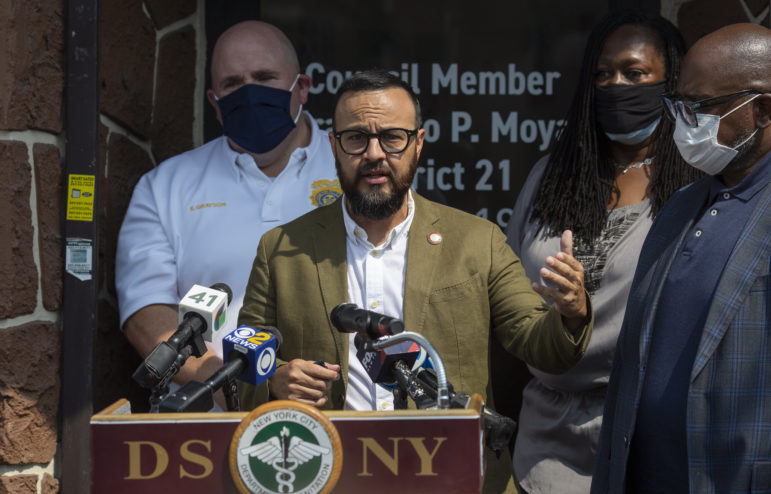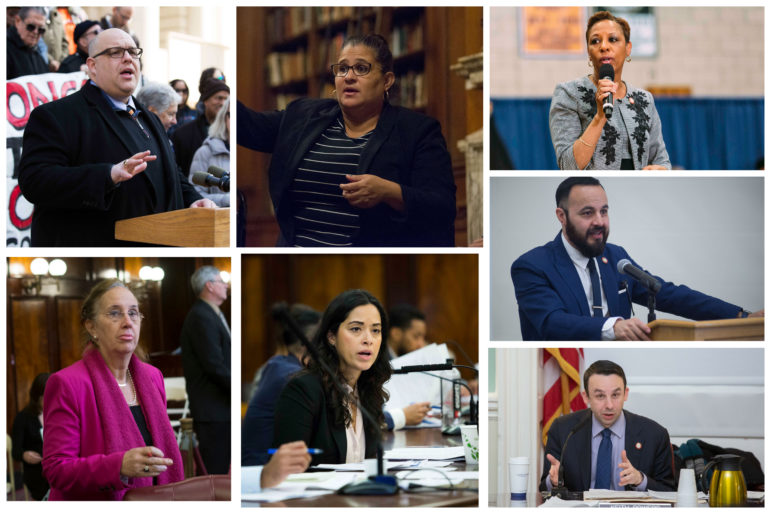From 2011 to 2017, Moya, rumored to be one of the Speaker candidates favored by incoming Mayor Eric Adams, served in the state Assembly and collaborated closely with the IDC—particularly when it came to the DREAM Act.

John McCarten/NYC Council
Councilmember Francisco Moya at an event in September.As the City Council Speaker race heads into its final stretch, Republican members and moderate Democrats stand to play an important role in determining the body’s next leader. One top candidate has touted his work across the political divide as he seeks to steer the legislative body.
“I am the only candidate for speaker who has had a long, successful career in Albany and City Hall and who has a track record of working across the political spectrum,” Queens Councilmember Francisco Moya told City Limits earlier this month.
What does that mean exactly? Moya’s past ties to the state Senate’s Independent Democratic Conference (IDC), a faction of Democrats that caucused with the Republican majority from 2011 until 2018, provide some context.
From 2011 to 2017, Moya, rumored to be one of the Speaker candidates favored by incoming Mayor Eric Adams, served in the state Assembly and collaborated closely with the IDC—particularly when it came to the DREAM Act, a bill he sponsored to expand access to state tuition grants and scholarships for undocumented immigrant students.
While the Democratic-controlled Assembly overwhelmingly supported the DREAM Act, the Republican-held Senate did not. Nevertheless, IDC Leader Jeff Klein decided to back the bill and made frequent appearances with Moya while authoring joint op-eds on the measure.
But to Senate Democrats, Klein’s support for the DREAM Act wasn’t exactly in good faith. His critics considered it a cynical tactic to counter so-called mainline Democrats who said the breakaway IDC senators were empowering Republicans and blocking liberal priorities.
Klein orchestrated a floor vote in 2014 that exposed the divisions among Democrats and proved the bill did not have their complete support. The doomed bill failed in a vote of 30 in favor and 29 opposed, with two Democrats voting no. The bill needed 32 votes to pass. Republicans later used the issue to hammer moderate Democrats in swing districts in that year’s election. Upstate Democrat Ted O’Brien lost his seat despite voting against the DREAM Act, which did not pass in the Senate until Democrats gained control of the chamber in 2019.
Moya also worked with Klein and IDC members on at least three reports, including two on predatory employment agencies that rip off immigrants and another on used car sale scammers. They later sponsored legislation related to both issues. Moya and Klein also teamed up in 2016 in a push for stricter consumer regulations of Herbalife, a multi-level marketing company that sells dietary supplements.
READ MORE: The NYC Council Speaker Candidates on Their Legislative Priorities
That work with the IDC has divided influential labor groups who see Moya either as an effective transactional politician, or as a self-promoter who knew the DREAM Act had no chance of passing. Some unions have been involved in an anyone-but-Moya campaign in the contentious Speaker’s race, while others have agreed to support Adams’ favored candidate—reportedly Moya.
“If you wanted to do more than pass a press release then it made sense to work with the IDC,” said one labor strategist. “The open question is, was it better for the DREAM Act to publicly go down to motivate Democrats to get their act together?”
Another Democratic strategist who has worked with Moya offered a different perspective.
“Politics is often about opportunity, but Moya’s ambition has always taken precedent over any commitment to a set of values, policies or ideology,” the strategist said. “Hence the common cause with IDC while claiming the progressive mantle.”

NYC Council on Flickr/Jeff Reed, Emil Cohen, John McCarten, William Alatriste
The wide field of candidates vying to be the next City Council speaker.The group No IDC NYC, which helped organize opposition to the breakaway senators, also slammed Moya for his past work with the group and Klein.
“New York needs a Council Speaker who embodies the progressive values of our city, who’ll work with the progressive majority we elected just last month, and will stand up to Eric Adams when needed,” said No IDC NYC member Erica Vladimer, an attorney and former IDC aide who accused Klein of sexual harassment. “New York does not need a Speaker who empowers Republicans.”
Progressive groups like Make the Road Action and VOCAL-NY have urged the Speaker candidates to eschew support from the Council’s five Republican members, likening overtures to the GOP to the “disastrous results of Democrats making power-sharing deals with Republicans” through the IDC.
Each of the seven Speaker candidates, including Moya, rejected that proposal.
In recent weeks, Republican members have been open to backing Moya in part because of his history in the Assembly and his more moderate politics compared to some other candidates, according to two people familiar with internal conversations among GOP members.
Moya’s supporters say working with the IDC, or even Republicans, was essential for passing anything in a divided legislature. His campaign spokesperson David Weiner framed his IDC ties as an example of his deal-making abilities.
“Councilmember Francisco Moya has spent his career working across the political spectrum to pass important legislation to improve the lives of all New Yorkers,” Weiner said. “In his campaign for New York City Council Speaker, he has reached out to communities across the city and he has a broad coalition of support.”
Despite the boost he would receive from a block of Republican votes, Moya was the lone Speaker candidate at a forum earlier this month to say that he would not include GOP councilmembers as part of his Budget Negotiating Team if elected Speaker. He cited his time in Albany as a guide.
“There’s a reason why we have a Democratic majority,” he said. “My experience in Albany has always been that we conference the Democratic side without having to have Republicans in that process, but there is a shared role we have to have when the speaker sits with the minority leader to discuss their priorities. I look at that as the model which I would take going into this year.”









